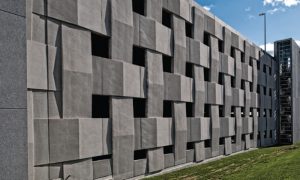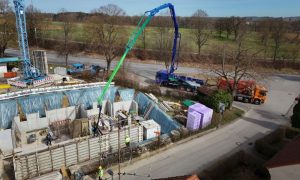Experts back Abu Dhabi height safety campaign
Health Authority Abu Dhabi calls for more education and awareness on high rise construction sites

Health and safety experts from the Health Authority – Abu Dhabi have added their backing to a new programme aimed at reducing the number of people killed or injured in falls on building sites in the UAE capital.
With an average of 72 deaths a year amongst people who work at height (since 2007), Abu Dhabi has long been aware of the dangers that come with unsafe practices on high-rise building sites. As a result, safety experts have now backed a campaign that highlights these risks and aims to improve current safety standards.
“There have been many cases in Abu Dhabi where workers, especially those at construction sites, operate on high buildings where no protection has been provided to prevent them from falling,” said Darren Joubert, senior advisor for occupational health at Health Authority – Abu Dhabi during the launch of the campaign.
“The awareness programme targets occupational health and safety professionals, employers, supervisors and workers,” he explained. “We shall conduct workshops and seminars involving employers and supervisors and educate them on how to implement safety regulations and providing protection at worksites.”
He added that supervisors would be trained on rescue guidelines that could help save lives in the event of an emergency.
Supported by the Ministry of Labour and the Environment, Health and Safety Centre, the initiative hopes to bring to an end a steady stream of fatalities, the section head of Occupational and Environmental Health at the HAAD said to The National, an Abu Dhabi based newspaper.
“If you look at occupational injuries [in 2011], they are the leading cause of fatalities in Abu Dhabi [out of a total of 537],” he said.
“The trend that you can see since 2007 is that every year there are between 60 and 80 fatal occupational injuries. That trend is not really going down, so we still need to do a lot more in terms of preventing these types of injuries.”
One cause of deaths and injuries is the hot weather which afflicts the GCC during the summer months. Working in oppressive heat conditions, workers often become faint and dehydrated, which can and has lead to accidents.
Despite this, the Ministry of Labour has refused to bring forward the obligatory lunchtime breaks for workers, which is scheduled to begin on June 15, even though temperatures in May are hitting the 50° mark.
However, the capital has stepped up its efforts to increase safety on construction sites, with licensed companies needing to register for Environment, Health and Safety Management System guidelines by last July. Failure to do so could mean that companies are refused building permits if their staff are not trained to an adequate level.
Statistics released by HAAD in January of this year showed ten fatalities from 29 construction accidents on building sites last year, in Abu Dhabi alone. It was the first time accident data was collated for a 12 month period.
Workers falling from heights or being hit by falling objects were the most common hazards for construction site labourers. Unsafe scaffolding and open shafts were also common workplace hazards.
























